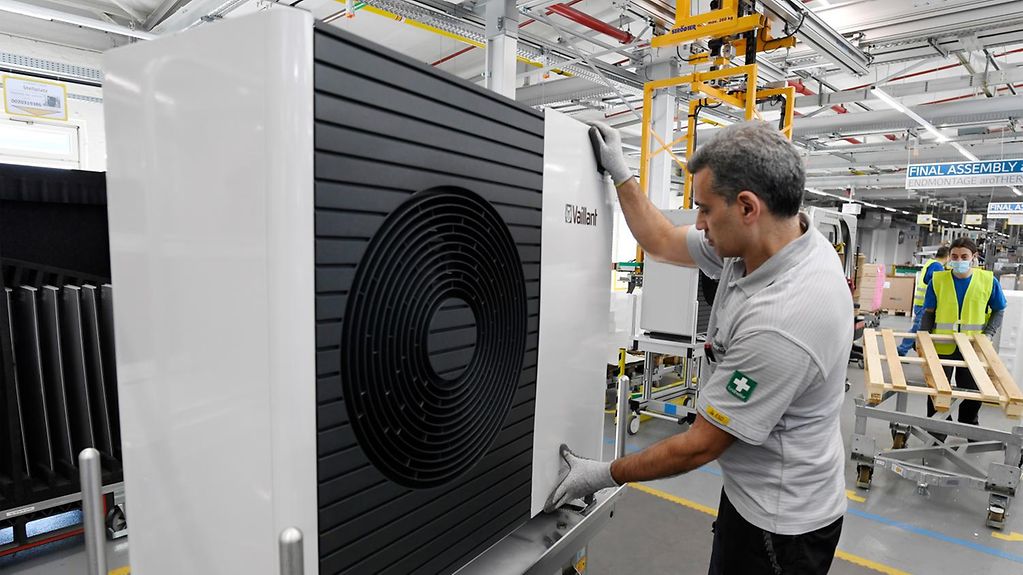The Federal Government’s skilled labour strategy
We need a large number of well-qualified skilled workers to help shape structural change, secure our economy, our prosperity, and our social systems. The skilled labour strategy, which was recently adopted by the Federal Cabinet, is aimed at attracting even more skilled workers at home and abroad and focuses on five specific areas.
3 min reading time

Securing skilled labour is a task for society as a whole. The only way for this to succeed is if all stakeholders in the labour market play an active role.
Photo: picture alliance/dpa
In many regions and sectors, there is already a shortage of the well-trained skilled workers we will need to protect the climate and to shape digital and demographic change, and the trend is set to increase in the coming years.
The latest skilled labour survey indicates that there will be about 240,000 more vacancies in 2026 than there will be workers available. The lack of skilled workers is already an existential issue for many companies.
"To ensure our future prosperity, we need skilled labour, intelligent people and all the help we can get," said Minister of Labour and Social Affairs Hubertus Heil. “That’s the only way to modernise and digitalise our country and put it on a more sustainable footing, which is why securing skilled labour is one of our most urgent tasks."
The new skilled labour strategy
To counteract the growing shortage of skilled workers, the Federal Government is focusing on five fields of action with its skilled labour strategy.
Up-to-date education: The dual education system remains a key factor in ensuring the competitiveness of German companies, along with modern and attractive training opportunities and early and comprehensive career guidance for all pupils.
Targeted professional development and training: In times of structural change, professional development and training is more necessary than ever: today’s labour force needs to have the wherewithal to do the work of tomorrow, which is why the Federal Government is planning to open up education and qualification opportunities to everybody, irrespective of age.
The Federal Employment Agency will be establishing a "National Online Continuing Education Platform" with financial support from the Federal Government to provide orientation for people interested in continuing education and training. As an additional funding instrument, a part-time education plan will also be introduced.
A more effective increase in labour potential: higher labour force participation: There is still great potential for women, who often work part-time, and mothers in particular, to participate more in the workforce . Although recent endeavours are having an effect, especially when it comes to the expansion of day care and family-related benefits, the Federal Government will be stepping up its efforts to increase women's participation in the labour market, such as by providing more opportunities for flexible working hours and extending childcare services.
Improving the quality of work and changing work culture: In addition, we need an employee-oriented work culture as well as more flexible retirement plans to ensure that skilled workers are able to continue in their professions for longer. The Federal Government is providing support for projects that contribute towards improving corporate culture.
It is also providing more information about the Flexi-Rente (flexi-pension) scheme with the goal of keeping older workers in employment for longer.
Modern immigration policy: Germany is also reliant on the immigration of foreign skilled workers, which means, among other things, that administrative procedures and the recognition of professional qualifications need to be simplified. Other requirements include making it easier for families to immigrate along with or after the main breadwinner and facilitating their integration into society, the education system, and the labour market. We also need to expand counselling services and language courses for potential immigrants in their countries of origin.
Securing skilled labour – a task for society as a whole
Securing skilled labour is a task for society as a whole. The only way for this to succeed is if all stakeholders in the labour market, which includes companies and enterprises, employees, the federal states and municipalities, civic partners, chambers, the Federal Employment Agency, education and training providers, and the Federal Government play an active role. The relevant measures will be developed and managed under the auspices of the Federal Government's skilled labour strategy, which will provide support for companies and enterprises interested in recruiting and retaining skilled workers.
The Federal Ministry of Labour, the Federal Ministry of Economics and the Federal Ministry of Finance presented the Federal Government's skilled labour strategy to their partners at the Skilled Labour Summit on 7 September 2022.